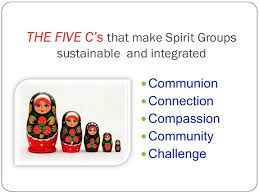WE SPACE –SpiritGroups

By the end of our first year at Unity Spiritual Center, there was a growing community of individuals dedicated to doing the deeper work of waking up and showing up. We were fortunate that meditation, contemplative prayer, the aspiration for the direct experience of God, and service to others was already a part our ministry’s culture. And, while there was a multitude of small group ministries within the church, each in its own way contributing to the well-being of its participants, there was not any sense of cohesion or meta-purpose uniting all groups to the fulfillment of the ministry’s mission. At times, groups competed for resources or recognition, often pulling the ministry with agenda-driven imperatives.
SpiritGroups is a multidimensional small group ministry program designed to be both a leadership development system as well as the WE space within which the conditions for personal and collective transformation are amplified. The SpiritGroups program was formulated by licensed Unity teacher Mendhi Audlin who synthesized a New Thought version of what has made Rich Warren’s purpose driven church possible—small group ministries. Not a church with small groups, but a church organized around a ministry of small groups. WE space is not something we have in our church, but rather who we are as The Beloved Community.

Embedded in the SpiritGroups program is leadership development. While there are no content experts running any small group, each one requires a host, either offering their home to meet in person or as a zoom host online. Along with other various group roles, the responsibility of process facilitator, who monitors the energetic flow of the group’s engagement, rotates each week. Church news and information can be conveyed via SpiritGroups rather than just sharing them as announcements on Sunday morning. The infrastructure required to implement the program grows organizational complexity as well as the maturity of participants who are called to deeper spiritual practice.
At the heart of SpiritGroups is an innovative approach to linking each small group to five spiritual disciplines (the Five C’s). These disciplines constitute the coherence, balance, and accountability between the various groups and the ministry as a whole.

- All members, regardless of a group’s theme, grow in their practice of finding Spirit within themselves, within others, and in their life circumstances. They begin each meeting with prayer, meditation or a centering exercise. (Communion)
- All group members whatever the focus, engage each other in a deep, meaningful manner and relationships are built. (Connection).
- Members learn to proactively support and care for one another and due to the intimacy of the small group, no one falls through the cracks (Compassion).
- Groups choose to be in service to the broader community by taking on some meaningful service project either within or beyond the church community (Community).
- Finally, members seek to awaken their emotional, spiritual, a transformational maturity through discussion, study, authentic action and shadow integration (Challenge).
Absent of these five disciplines, it is possible for some groups to become indefinite sub-cultures within the ministry. This doesn’t happen with SpiritGroups as they form and dissolve at established intervals within three to five launch windows in a calendar year. At the conclusion of each SpiritGroup cycle, all groups meet for a community-wide celebration.
Because SpiritGroups typically meet in homes, offices, clubhouses, or other venues off campus, people are more inclined to join a friend for communion, connection, compassion, community and challenge. They discover a new relationship, not so much to the ministry, but to the mission of the ministry (Transforming Lives). This often results not only in their return, but a renewal of their involvement and support. In other words, the SpiritGroups program has the capacity to bring back into the fold, the disenfranchised and those that have fallen by the wayside.
In addition, and in particular, the SpiritGroups program is appealing to Millennials because the engagement of the small group dynamic is facilitated via a web-based platform. Those interested in a small group hosted by other Millennials, can go online from any device to discover SpiritGroups of interest and register for each group. Video-based content is available that suggests guidelines for discussion and group process.
Finally, the SpiritGroups program, in addition to the Quantum Living Process is the perfect partnership for the growing up and cleaning up aspects of cultural evolution. Imagine, while individual SpiritGroups are autonomous with respect to the subject matter or theme of the group, all are bound by the common practice of the 5 disciplines. Each group holds its members in prayer. Every group plans a social gathering and takes on a service project with or beyond the ministry. Although each group is unique, due to the uniformity of the Five C’s, there is a cohesive thread of common experience shared among participants.

A final consideration for SpiritGroups revolves around the “hidden curriculum” – namely the insightful awakened gestalt moments that spontaneously occur, as well as the personal and collective evolutionary transformation. The Sunday worship experience, in and of itself, does not have the capacity to evoke a depth of transformation in comparison to the small group, WE space, experience common in the SpiritGroup program.
Love and Blessings, Gary